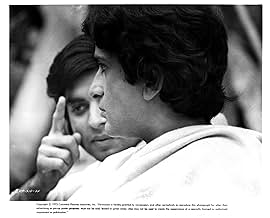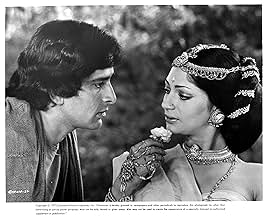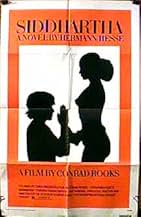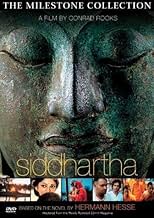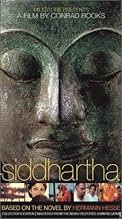NOTE IMDb
6,6/10
1,3 k
MA NOTE
Ajouter une intrigue dans votre langueThe story of a young Indian who embarks upon a journey to find the meaning of existence. Based on the novel by Hermann Hesse.The story of a young Indian who embarks upon a journey to find the meaning of existence. Based on the novel by Hermann Hesse.The story of a young Indian who embarks upon a journey to find the meaning of existence. Based on the novel by Hermann Hesse.
Histoire
Le saviez-vous
- AnecdotesSimi Garewal took the boldest step in her career by going topless for a scene in this film. It was the first topless scene in the history of Bollywood and created a massive uproar. When the scene was featured on the cover of two English magazines, it created more controversy and ended up in court. The film eventually got banned in India. When asked about it years later, Garewal, who said she was never shy, revealed that she would have stripped totally naked if they had let her. In fact, she had been totally nude in front of the filming crew for Mera Naam Joker the same year, but they only showed her from the back onscreen. She said she loved the freedom of losing her inhibitions and her clothes.
- Citations
Siddhartha: I have come to say, that you are all the things that will outlive me, that you, Kamala, will be all the beauty that will be in the shadow we leave. You will be my first love, my only love.
- ConnexionsReferenced in Génération pub: Melissa and Men (1991)
- Bandes originalesMother's Song
by Shanti Hiranand
Commentaire à la une
After seeing this movie again in New York recently and noticing that it was going to be available on DVD, I ordered it immediately through Amazon.com and decided to send the following comments, which were posted in the "customer reviews" section:
1. The plot. The Nobel Prize winner, Hermann Hesse, wrote Siddhartha in 1922. It is a novel about Eastern spirituality (many Indian scholars consider it as one of the few successful examples of Indian philosophy presented by a Western author). Siddhartha is one of the names given to the Buddha himself. The novel narrates the pilgrimage of the son of a Brahmin, his struggle to find his own destiny; his friendship with Govinda (his "shadow"); his encounters with many different people: the Samanas (the ascetics that practice self-denial); Kamala (a courtesan who claims that she can teach and provide love as an art); Kamasawami (a rich merchant who becomes his boss); and Vasudeva... - note Vasudeva is another name given to Krishna, the teacher/driver of Arjuna in the Bhagavad-Gita).
2. The Movie. In 1972, Conrad Rooks (an almost unknown movie director who made "Chappaqua" in 1966) came out with a 94-minute movie transcription of Hesse's novel. He engaged Sven Nykvist (the famous Swedish cinematographer of Igmar Bergman) and a mainly Indian cast, including Shashi Kapoor (Siddhartha), Simi Garewal (Kamala), Romesh Sharma (Govinda) and Zul Vellani (Vasudeva). The beautiful music was composed by Hemanta Mukherjee (I hope the soundtrack will be available soon). It will be particularly enjoyable for those who have read the book. In many of the scenes the synergism produced by the photography, the music and the acting is superb. And with few exceptions, the movie is a good transcription of the book. The book and the movie became part of the "cult culture" of the West coast of the early seventies, but it never got the attention of the general public. With a condescending tone, Leonard Maltin refers to the movie as "too arty, but on-location photography ... is often dazzling".
After seeing the DVD transfer I was very happy with its high quality. There are 27 interesting minutes of comments made by Conrad Rooks about why and how he made the movie 30 years ago. With the DVD technology I am able to enjoy my favorite scenes and particularly the music of Hemanta Mukherjee on texts from another Nobel Prize, Rabindranath Tagore. Because of these unforgettable moments, I give a rating of 10, absolving Rooks from his "youth sins".
1. The plot. The Nobel Prize winner, Hermann Hesse, wrote Siddhartha in 1922. It is a novel about Eastern spirituality (many Indian scholars consider it as one of the few successful examples of Indian philosophy presented by a Western author). Siddhartha is one of the names given to the Buddha himself. The novel narrates the pilgrimage of the son of a Brahmin, his struggle to find his own destiny; his friendship with Govinda (his "shadow"); his encounters with many different people: the Samanas (the ascetics that practice self-denial); Kamala (a courtesan who claims that she can teach and provide love as an art); Kamasawami (a rich merchant who becomes his boss); and Vasudeva... - note Vasudeva is another name given to Krishna, the teacher/driver of Arjuna in the Bhagavad-Gita).
2. The Movie. In 1972, Conrad Rooks (an almost unknown movie director who made "Chappaqua" in 1966) came out with a 94-minute movie transcription of Hesse's novel. He engaged Sven Nykvist (the famous Swedish cinematographer of Igmar Bergman) and a mainly Indian cast, including Shashi Kapoor (Siddhartha), Simi Garewal (Kamala), Romesh Sharma (Govinda) and Zul Vellani (Vasudeva). The beautiful music was composed by Hemanta Mukherjee (I hope the soundtrack will be available soon). It will be particularly enjoyable for those who have read the book. In many of the scenes the synergism produced by the photography, the music and the acting is superb. And with few exceptions, the movie is a good transcription of the book. The book and the movie became part of the "cult culture" of the West coast of the early seventies, but it never got the attention of the general public. With a condescending tone, Leonard Maltin refers to the movie as "too arty, but on-location photography ... is often dazzling".
After seeing the DVD transfer I was very happy with its high quality. There are 27 interesting minutes of comments made by Conrad Rooks about why and how he made the movie 30 years ago. With the DVD technology I am able to enjoy my favorite scenes and particularly the music of Hemanta Mukherjee on texts from another Nobel Prize, Rabindranath Tagore. Because of these unforgettable moments, I give a rating of 10, absolving Rooks from his "youth sins".
- gabravo123
- 18 déc. 2002
- Permalien
Meilleurs choix
Connectez-vous pour évaluer et suivre la liste de favoris afin de recevoir des recommandations personnalisées
- How long is Siddhartha?Alimenté par Alexa
Détails
- Date de sortie
- Pays d’origine
- Sites officiels
- Langue
- Aussi connu sous le nom de
- На пути к истине
- Lieux de tournage
- Société de production
- Voir plus de crédits d'entreprise sur IMDbPro
- Durée1 heure 29 minutes
- Mixage
- Rapport de forme
- 2.35 : 1
Contribuer à cette page
Suggérer une modification ou ajouter du contenu manquant

Lacune principale
By what name was Siddhartha (1972) officially released in Canada in English?
Répondre


